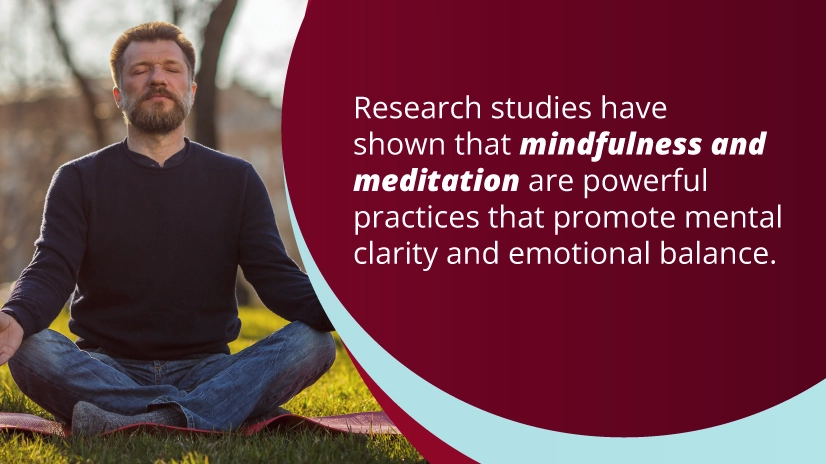
Ways to Improve Your Mental Health
Clinically Reviewed by:
Improving your mental health is a journey that begins with understanding and nurturing your emotional well-being. By implementing healthy habits and seeking support when needed, you can enhance your resilience and overall happiness.
Numerous strategies contribute to mental wellness, from practicing mindfulness and maintaining a balanced lifestyle to fostering positive relationships and managing stress effectively. This article explores these methods in-depth, offering a roadmap toward achieving greater mental clarity and emotional stability in everyday life.
Key Takeaways
Mental health is a vital characteristic of overall well-being, encompassing emotional, psychological, and social well-being. Here’s what you need to know:
- Prioritize regular exercise and physical activity to boost mood and reduce stress.
- Practice mindfulness and relaxation methods daily to manage anxiety and improve focus.
- Cultivate strong social connections and seek support from loved ones to enhance emotional resilience.
If you or your family member help dealing with emotional health problems, Contact Indiana Center for Recovery at (844) 650-0064 for more information and long-term recovery assistance.

Strategies To Improve Mental Health
Improving mental health clarity involves a combination of strategies that can vary from person to person, but here are some general ways that can be helpful:
Regular Physical Exercise
Engaging in regular physical exercise significantly boosts mental health. When you exercise, your brain releases endorphins, which are chemicals that improve mood and reduce anxiety and depression. Activities such as walking, running, swimming, or even dancing can be very effective.
Aim for at least thirty minutes of sensible exercise most days of the week. Not only does this improve your mood, but it also increases energy levels and promotes healthier sleep.
Healthy Eating Habits
Healthy eating habits are important in maintaining good mental health. Consuming a balanced diet rich in vegetables, fruits, whole grains, and lean proteins provides the nutrients your brain needs to function properly.
Avoiding processed foods, excessive sugar, and caffeine can prevent mood swings and anxiety and weaken the immune system. To support brain health, include diets high in omega-3 fatty acids, like salmon and walnuts. Drinking sufficient water is also essential, as dehydration can lead to confusion and decreased mental clarity.
Adequate Sleep
Getting enough sleep is vital for psychological and social well-being. Good sleep allows your brain to rest and repair itself, which is essential for maintaining emotional stability and cognitive function. Adults should goal for seven to nine hours of sleep per night.
Make a regular sleep timetable by going to bed and waking up at the same time every day, even on weekends. Create a soothing bedtime routine, such as reading a book or taking a warm bath, to signal to your body that it’s time to wind down. Avoid screens and heavy meals before bedtime to ensure a restful night’s sleep.
Building Resilience And Coping Skills
Building resilience comprises developing the ability to bounce back from adversity stronger than before. This can be achieved through several key practices. First, cultivating a strong support network of friends, family, or support groups raises a sense of belonging and offers emotional support during challenging times. Second, practicing problem-solving skills and learning from setbacks helps build resilience. Lastly, maintaining a positive outlook and focusing on personal growth contribute significantly to enhancing resilience.
Stress Management Techniques
Effective stress management is vital for maintaining good mental health. Techniques such as deep breathing exercises, physical activity, and time management help in reducing stress levels. These methods enable young people to regain control over their emotions and thoughts, fostering a sense of calmness and clarity.
Mindfulness And Meditation
Research studies have shown that mindfulness and meditation are powerful practices that promote mental clarity and emotional balance. By focusing on the present moment through mindful practices and meditation exercises, individuals can reduce anxiety and improve overall well-being. These practices cultivate a heightened awareness of thoughts and feelings, promoting a more centered and grounded state of mind.
Developing A Positive Mindset
Developing a positive mindset involves actively cultivating optimistic perspectives and attitudes. It includes reframing negative thoughts into more constructive ones and embracing gratitude. By consciously choosing to focus on the positive parts of situations, individuals can enhance their resilience and emotional well-being. This mindset shift fosters a sense of authorization and encourages proactive problem-solving.
Social Connections And Support Systems
Social connections play a dynamic role in mental and physical health by providing emotional support and a sense of belonging. Strong relationships with family, friends, and community members can buffer against stress and improve overall well-being. Regularly engaging in social activities, whether through hobbies or community events, helps foster meaningful connections and reduces negative feelings.
Importance Of Strong Relationships
Strong relationships contribute significantly to better mental health by providing emotional support during challenging times. Trusted and good relationships can offer comfort, encouragement, and a sense of security, which are crucial for maintaining psychological resilience. Feeling connected to others helps reduce the risk of depression and anxiety, promoting a positive outlook on life.
Seeking Professional Help
Getting professional support is a proactive step towards improving mental health. Therapists and counselors are trained to offer evidence-based treatments that can help manage stress, anxiety, and other mental health concerns. They offer a safe place to discuss emotions and develop coping strategies tailored to individual requirements. Professional support can empower young and older people to navigate challenges effectively and enhance their overall quality of life.
Healthy Lifestyle Choices
Making healthy lifestyle choices plays a crucial role in maintaining mental and physical well-being. Eating a balanced food rich in fruits, vegetables, and lean proteins supports brain function and energy levels. Prioritizing sufficient sleep—typically 7-9 hours nightly—restores cognitive function and mood stability. Regular medical check-ups ensure early detection of health issues, promoting proactive management and peace of mind.
Limiting Alcohol And Avoiding Drugs
Limiting alcohol consumption and avoiding recreational drugs safeguard mental health. Alcohol and drugs can exacerbate anxiety depression, and disrupt sleep patterns. Choosing non-alcoholic alternatives and seeking help for substance use disorders are vital steps towards healthier living.
Pursuing Hobbies And Interests
Engaging in hobbies and interests provides a fulfilling outlet for creativity and relaxation. Activities such as gardening, painting, or playing a musical instrument stimulate the mind and reduce stress. Joining clubs or community groups based on shared interests fosters social connections and boosts self-esteem.
Time Management And Setting Boundaries
Effective time management enhances productivity and reduces stress. Prioritizing tasks and breaking them into manageable steps ensures a balanced workload. Setting boundaries at work and in personal relationships protects mental well-being by preventing burnout and fostering healthy communication.
Mental Health Resources And Tools
Accessing mental health resources and tools can empower individuals to manage their emotional problems effectively. Websites like Psychology Today offer articles and therapist directories for finding professional support.
Helplines such as the National Suicide Prevention Lifeline provide immediate assistance during crises. Mobile apps like Headspace offer guided meditation sessions for stress reduction and improved focus. Online forums and community platforms like Reddit’s mental health subreddits provide peer support and shared experiences.
Books And Literature
Books and literature play a decisive role in understanding and improving emotional health. Edmund J. Bourne’s “The Anxiety and Phobia Workbook” offers practical techniques for managing anxiety, and Johann Hari’s “Lost Connections” explores societal factors influencing mental health.
Fictional works like Matt Haig’s “Reasons to Stay Alive” provide personal insights into overcoming depression. Literary classics such as Viktor Frankl’s “Man’s Search for Meaning” offer philosophical perspectives on finding purpose amidst adversity.
Apps And Online Resources
Apps and online resources provide convenient tools for enhancing mental well-being. Calm app offers guided meditations and sleep stories to promote relaxation. Talkspace provides online therapy sessions with licensed professionals via video chat or messaging.
The MoodTools app includes mood tracking and coping skill exercises for managing depression. Websites like BetterHelp offer access to licensed therapists for personalized counseling from home.
Support Groups And Networks
Joining support groups and networks can provide valuable emotional support and solidarity. Local organizations like NAMI (National Alliance on Mental Illness) host peer-led support groups for individuals and families.
Online communities such as 7 Cups offer anonymous chat rooms for discussing mental health concerns. Social media groups focused on mental health advocacy provide platforms for sharing resources and connecting with others facing similar challenges.
Frequently Asked Questions (FAQ)
To feel mentally better, you can do several things: practice deep breathing or meditation for relaxation, engage in regular exercise to boost endorphins, maintain a healthy diet for stable energy levels, get enough sleep to recharge, limit screen time to reduce stress, connect with friends or loved ones for social support, and consider seeking professional help if needed. Small, consistent changes can make a big difference in your mental well-being.
Start with mindfulness or meditation for a few minutes, engage in physical activity like walking or yoga, maintain a balanced diet with plenty of water, ensure quality sleep, connect with loved ones or friends, limit screen time, practice gratitude through journaling, and set achievable daily goals. Taking breaks and deep breathing exercises throughout the day also help manage stress and promote overall well-being.
Recognize deteriorating mental health by noticing persistent mood changes like increased irritability or sadness, withdrawing from social activities, experiencing intense anxiety or panic attacks, increased heart rate, changes in sleep patterns (too much or too little), difficulty concentrating or making decisions, changes in appetite or weight, and engaging in risky behaviors.
Physical signs such as headaches or digestive issues may also accompany mental health decline. It’s crucial to seek support from loved ones or professionals if these signs persist or worsen.






 100% Confidential
100% Confidential